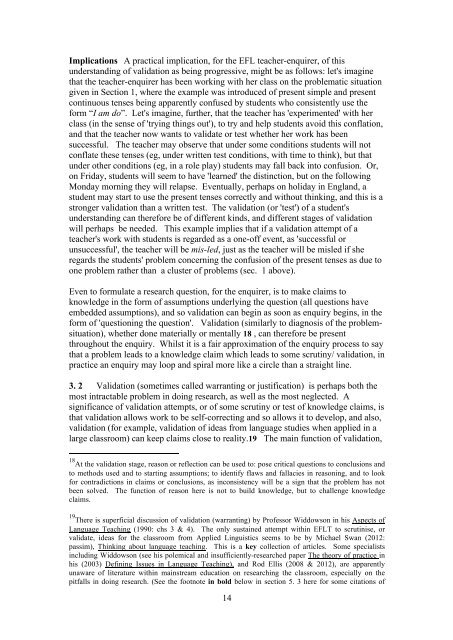RADICAL TEFL
2hqhXJd
2hqhXJd
You also want an ePaper? Increase the reach of your titles
YUMPU automatically turns print PDFs into web optimized ePapers that Google loves.
Implications A practical implication, for the EFL teacher-enquirer, of this<br />
understanding of validation as being progressive, might be as follows: let's imagine<br />
that the teacher-enquirer has been working with her class on the problematic situation<br />
given in Section 1, where the example was introduced of present simple and present<br />
continuous tenses being apparently confused by students who consistently use the<br />
form “I am do”. Let's imagine, further, that the teacher has 'experimented' with her<br />
class (in the sense of 'trying things out'), to try and help students avoid this conflation,<br />
and that the teacher now wants to validate or test whether her work has been<br />
successful. The teacher may observe that under some conditions students will not<br />
conflate these tenses (eg, under written test conditions, with time to think), but that<br />
under other conditions (eg, in a role play) students may fall back into confusion. Or,<br />
on Friday, students will seem to have 'learned' the distinction, but on the following<br />
Monday morning they will relapse. Eventually, perhaps on holiday in England, a<br />
student may start to use the present tenses correctly and without thinking, and this is a<br />
stronger validation than a written test. The validation (or 'test') of a student's<br />
understanding can therefore be of different kinds, and different stages of validation<br />
will perhaps be needed. This example implies that if a validation attempt of a<br />
teacher's work with students is regarded as a one-off event, as 'successful or<br />
unsuccessful', the teacher will be mis-led, just as the teacher will be misled if she<br />
regards the students' problem concerning the confusion of the present tenses as due to<br />
one problem rather than a cluster of problems (sec. 1 above).<br />
Even to formulate a research question, for the enquirer, is to make claims to<br />
knowledge in the form of assumptions underlying the question (all questions have<br />
embedded assumptions), and so validation can begin as soon as enquiry begins, in the<br />
form of 'questioning the question'. Validation (similarly to diagnosis of the problemsituation),<br />
whether done materially or mentally 18 , can therefore be present<br />
throughout the enquiry. Whilst it is a fair approximation of the enquiry process to say<br />
that a problem leads to a knowledge claim which leads to some scrutiny/ validation, in<br />
practice an enquiry may loop and spiral more like a circle than a straight line.<br />
3. 2 Validation (sometimes called warranting or justification) is perhaps both the<br />
most intractable problem in doing research, as well as the most neglected. A<br />
significance of validation attempts, or of some scrutiny or test of knowledge claims, is<br />
that validation allows work to be self-correcting and so allows it to develop, and also,<br />
validation (for example, validation of ideas from language studies when applied in a<br />
large classroom) can keep claims close to reality.19 The main function of validation,<br />
18 At the validation stage, reason or reflection can be used to: pose critical questions to conclusions and<br />
to methods used and to starting assumptions; to identify flaws and fallacies in reasoning, and to look<br />
for contradictions in claims or conclusions, as inconsistency will be a sign that the problem has not<br />
been solved. The function of reason here is not to build knowledge, but to challenge knowledge<br />
claims.<br />
19 There is superficial discussion of validation (warranting) by Professor Widdowson in his Aspects of<br />
Language Teaching (1990: chs 3 & 4). The only sustained attempt within EFLT to scrutinise, or<br />
validate, ideas for the classroom from Applied Linguistics seems to be by Michael Swan (2012:<br />
passim), Thinking about language teaching. This is a key collection of articles. Some specialists<br />
including Widdowson (see his polemical and insufficiently-researched paper The theory of practice in<br />
his (2003) Defining Issues in Language Teaching), and Rod Ellis (2008 & 2012), are apparently<br />
unaware of literature within mainstream education on researching the classroom, especially on the<br />
pitfalls in doing research. (See the footnote in bold below in section 5. 3 here for some citations of<br />
14


